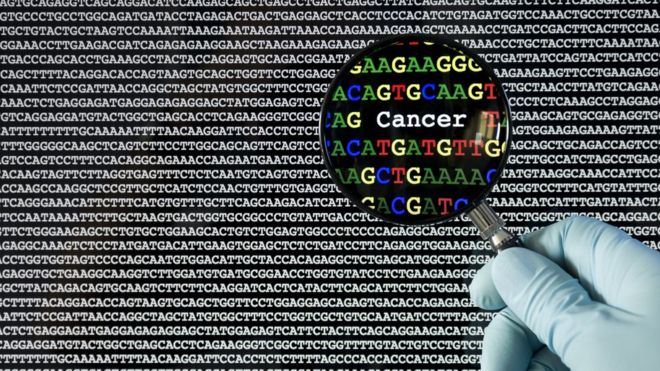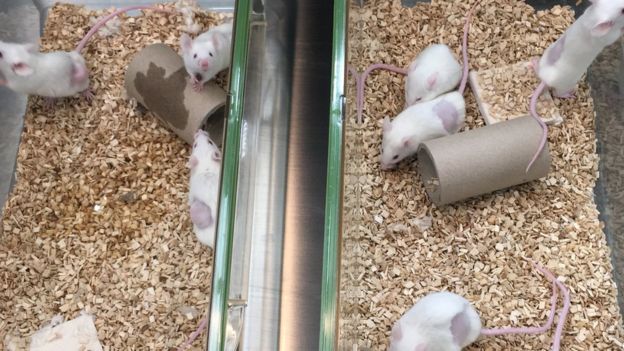A Brief Colonial History Of Ceylon(SriLanka)
Sri Lanka: One Island Two Nations
A Brief Colonial History Of Ceylon(SriLanka)
Sri Lanka: One Island Two Nations
(Full Story)
Search This Blog
Back to 500BC.
==========================
Thiranjala Weerasinghe sj.- One Island Two Nations
?????????????????????????????????????????????????Thursday, June 28, 2018
DNA 'barcode' delivering personalised breast cancer care
 Image copyrightGETTY IMAGES
Image copyrightGETTY IMAGES
-
Scientists in Cambridge say advances in genetics are set to transform
the treatment of breast cancer, making it more personalised to each
patient.
Doctors say it is helping them chose the right treatment and predict whether patients are likely to experience side effects.
It can also reveal whether their cancer is becoming resistant to treatment.
Cancer 'barcode'
Carlos Caldas, Prof of Cancer Medicine and programme director at Cancer Research UK Cambridge Institute, said: "By sequencing the tumour we have something like a barcode which gives us the pattern of mutations in that cancer."We can understand how the body, and in particular the immune cells are responding and this enables us to deliver more precision medicine.
"This barcode also enables us to do surveillance and identify early whether a tumour is coming back because it is developing resistance to treatment - when those cells start releasing their DNA we can detect them in a blood test known as a liquid biopsy."
To date, 275 women have joined the Personalised Breast Cancer Programme in Cambridge, which was launched in 2016 with just over £1m funding from Addenbrooke's Charitable Trust.
They aim to enrol 2,000 patients in the next four years.
Prof Caldas said: "Breast cancer is not one but 10 or 11 diseases that are distinct molecular entities and we will increasingly see patients being categorised into one of these groups, enabling us to tailor the way we monitor them; it's a dramatic improvement in the way we personalise their treatment."
How it works:
- All cancer patients have two genomes - the so-called germline DNA they inherited from their parents and the corrupted genetic code in their cancer
- Women diagnosed with breast cancer in Cambridge have a sample of their tumour and of their blood sent for sequencing, with the full results coming back within 12 weeks
- The germline genome can tell whether they inherited mutations in BRCA1, BRCA2 genes, which increases their risk of both breast and ovarian cancer - these findings can also have implications for their wider family
- Tumour sequencing allows researchers to catalogue all the mutations in cancer cells and enables them to predict whether they will respond to specific treatments
- Some drugs, known as targeted therapies, are designed for people whose cancer cells have specific gene mutations which 'drive' tumour growth
Elizabeth Banns, 61, joined the study after she was diagnosed with inflammatory breast cancer last year.
Like other patients, she had surgery, chemotherapy and radiotherapy.
Despite this extensive treatment, her cancer returned and is now incurable, but Elizabeth remains optimistic: "Being part of research gives you are feeling of control and being part of something."
She told me: "It's reassuring knowing that I don't have to keep going back for biopsies because they have my genetic code and that of my cancer; it's banked and hopefully it will mean that first one targeted drug trial and then another will come along that I will be eligible for."
 Image captionThe mice on the left have visible tumours under the skin whereas those on the right had successful treatment
Image captionThe mice on the left have visible tumours under the skin whereas those on the right had successful treatmentBreast cancer patients in Cambridge are also offered the opportunity to take part in research involving so-called mouse avatars.
Within an hour of their biopsy, samples from their tumour is injected under the skin of laboratory mice.
These cancer avatars are used to model the effects of different treatments.
I was shown two sets of mice, all carrying the same tumour.
Mouse avatars
The patient had not responded to chemotherapy, and nor did the mouse avatars that were given the same drug - the tumours could be seen growing under their skin.The second group were given a different drug from the patient and their tumours had not grown.
The hope is, for some patients, it will identify the most promising drugs and eliminate others which are unlikely to work.
Dr Alejandra Bruna, molecular biologist, Cancer Research UK Cambridge Institute told me: "We want to reduce the number of toxic drugs that we give to patients, and where possible treat them with targeted therapies with fewer side effects."
The patients' tumours are also grown in cells lines, enabling the majority of drug testing to be done in laboratory dishes, so minimising the number of animal tests.
The project is still at the research stage and not directly influencing clinical decisions.
Follow Fergus on Twitter.


